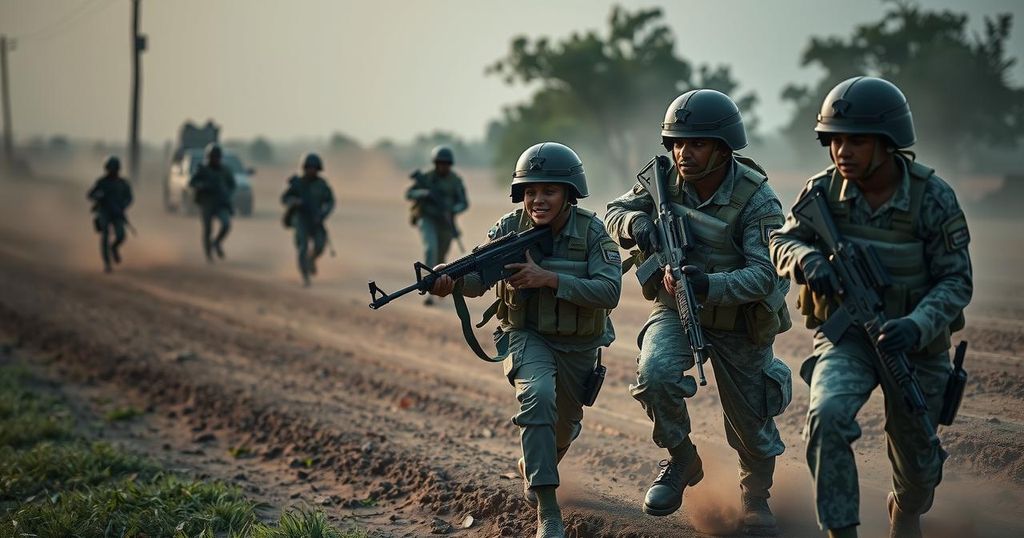Politics
AA, ARAKAN, ARAKAN ARMY, ASIA, BANGLADESH, CHINA, DECCAN HERALD, DEFENSE, DIPLOMACY, GEOPOLITICS, INDIA, INFRASTRUCTURE DEVELOPMENT, INTERNATIONAL RELATIONS, KALADAN, KALADAN MULTI - MODAL TRANSPORT AND TRANSIT PROJECT, KALADAN RIVER, KMTT, KMTTP, KOLKATA, MEXICO, MIZORAM, MYANMAR, NORTH AMERICA, PALETWA, RAKHINE, SITTWE
Omar El-Sharif
Geopolitical Implications of Arakan Army’s Control in Rakhine State
The Arakan Army’s recent capture of a key military post along the Myanmar-Bangladesh border signifies a pivotal point in the ongoing conflict, allowing the AA unprecedented control. This regional development not only advances the AA’s aspirations for an independent Arakan state but also raises significant implications for neighboring countries, particularly India and China, due to strategic projects like the Kaladan Multi-Modal Transport and Transit Project.
The ongoing strife in Myanmar between the Junta Army and the Arakan Army (AA) has led to significant geopolitical shifts. Recently, the AA has captured a vital military post, allowing it to control a 271-kilometer border with Bangladesh. This unprecedented event in Myanmar’s history marks the first instance whereby an armed group has established full control over a national border, prompting urgent considerations regarding Myanmar’s future and its relations with neighboring countries.
The AA, representing the Buddhist Rakhine ethnic group, has celebrated a significant triumph within Rakhine state, where they are the predominant population. This accomplishment symbolizes the culmination of the AA’s prolonged aspiration for an independent region, as it draws closer to achieving a self-governing Arakan state. Such developments hold considerable ramifications for regional stability, particularly for neighboring nations such as India and China, which share strategic interests in the area.
Although Rakhine does not directly border India, the region’s evolving situation has deep implications for the nation. Central to these concerns is the Kaladan Multi-Modal Transport and Transit Project (KMTTP), which traverses Rakhine and includes a crucial port in Sittwe, leading to Paletwa. The KMTTP is strategically important for India as it seeks to bolster maritime connections with Southeast Asia, specifically between Kolkata and Sittwe. Additionally, the vital Kaladan river serves as a connection point between Mizoram and Sittwe, suggesting that shifts in Rakhine’s geopolitical landscape will have repercussions that extend beyond Myanmar to impact both India and other regional players like China and Bangladesh.
The significance of the KMTTP for India underscores the need for maintaining stability in Rakhine. China, which also has vested interests in this region, must be concerned about how any escalation could affect its investments and influence, as it seeks to broaden its footprint in South Asia. Furthermore, Bangladesh remains on high alert due to the ongoing Rohingya crisis, which was exacerbated by previous conflicts in Rakhine, thus reinforcing the urgency for diplomatic engagement to ensure regional harmony and mitigate potential humanitarian crises.
The conflict between the Myanmar military (Junta) and the Arakan Army has escalated recently, particularly following the AA’s capture of a military post at the Myanmar-Bangladesh border. Given that the AA is composed predominantly of the Rakhine ethnic group, this event signifies a historical turning point for the group’s quest for autonomy. The implications of this conflict extend beyond Myanmar, involving significant regional players like India, Bangladesh, and China due to economic and security interests tied to the situation in Rakhine state.
In conclusion, the Arakan Army’s recent control over significant territories in Rakhine, especially the border with Bangladesh, presents profound implications for the geopolitical landscape of South Asia. The ongoing conflict, coupled with projects like the KMTTP, necessitates careful attention from neighboring nations, including India and China, to ensure stability in the region. As the AA moves closer to its goals of self-governance, the risk of escalation within the region remains a sound concern for all involved parties.
Original Source: www.india.com








Post Comment